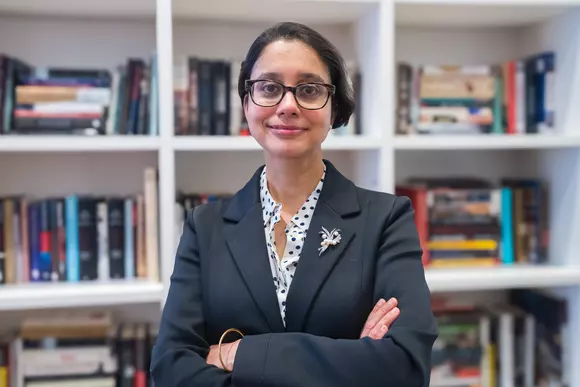Tuesday, March 18, 2025 | 8:00 AM EDT
Efforts to normalize relations between India and China signal a potential shift in one of Asia’s most complex rivalries. As both countries navigate de-escalation efforts while advancing competing strategic interests and structural issues remain, we will examine the geopolitical calculus behind the apparent thaw and its implications for regional security. How will these developments shape India’s engagement with China, the Quad, and the broader Indo-Pacific balance?
At this critical juncture, on March 18, 2025, Mark Frazier sat down with Manjari Chatterjee Miller and Liu Zongyi to evaluate the strategic dimensions of this evolving relationship. They discussed its potential effects on regional security, the power equilibrium in the Indo-Pacific, and the roles of important mini-lateral groupings like BRICS and the Quad.
Speakers

Manjari Chatterjee Miller
Manjari Chatterjee Miller is professor of international relations and the inaugural Munk Chair in Global India at the Munk School. She is a senior fellow at the Council of Foreign Relations and an associate at the Asia Center, Harvard University. Dr. Miller is the author of Why Nations Rise: Narratives and the Path to Great Power (2021, shortlisted for the 2022 Hedley Bull Prize in International Relations), Wronged by Empire: Post-Imperial Ideology and Foreign Policy in India and China (2013), and the co-editor of the Routledge Handbook of China-India Relations (2020).
Previously, Dr. Miller was a tenured associate professor at Boston University’s Pardee School of Global Studies and has held fellowships at Harvard and Princeton. She has published numerous articles in peer-reviewed and policy journals, and chapters in edited books. A frequent contributor to media and policy outlets in the United States and abroad, from 2020 to 2024 Dr. Miller was a columnist for the Hindustan Times. She received a B.A. from the University of Delhi, an MSc. from the University of London, and a Ph.D. from Harvard University. She was a post-doctoral fellow in the China and the World Program at Princeton University.

Liu Zongyi
Liu Zongyi is a senior fellow and the director of the Center for South Asia Studies at the Shanghai Institutes for International Studies (SISS). He also serves as the director of the research office of major power relations at the Institute for International Strategic and Security Studies (SISS) and the director of the Centre for China Studies (Bangladesh). His research focuses on India’s economy and foreign policy, China’s foreign policy, BRICS, and the G-2. Dr. Liu has published extensively in Chinese and international journals and has contributed over 300 commentaries in both Chinese and English to various newspapers and magazines. Dr. Liu has been a visiting fellow at institutions including the German Development Institute, OECD, the Center for Strategic and International Studies, the Indian National Institute of Public Finance and Policy, and the Institute of Strategic Studies of Islamabad.
Dr. Liu holds a B.A. in economics from Shandong University of Finance, an M.A. in Chinese and American studies from The John Hopkins University Nanjing Center, and a Ph.D. in international relations from China Foreign Affairs University.
Moderator

Mark W. Frazier
Mark W. Frazier is a China-India scholar whose research interests focus on comparative urbanization, labor politics, and citizenship in China and India. He is a professor of politics at The New School (TNS), co-director of the India China Institute (ICI), and a fellow in the NCUSCR Public Intellectuals Program. Before joining TNS, Dr. Frazier was a Fulbright Research Fellow in China and held faculty positions at the University of Oklahoma and at Lawrence University in Wisconsin. He is co-editor of the forthcoming book, Constrained Expertise in India and China: Knowledge and Power in Policymaking (Amsterdam University Press, 2025) developed from an ICI project on the politics of expertise. His 2019 book, The Power of Place: Contentious Politics in Twentieth Century Shanghai and Bombay (Cambridge University Press), explored how urban geography, political institutions, and historical legacies shaped patterns of protest and labor activism in the two cities. He has written op-ed pieces for The New York Times, Daedalus, and The Diplomat. Dr. Frazier holds a Ph.D. from University of California, Berkeley.
